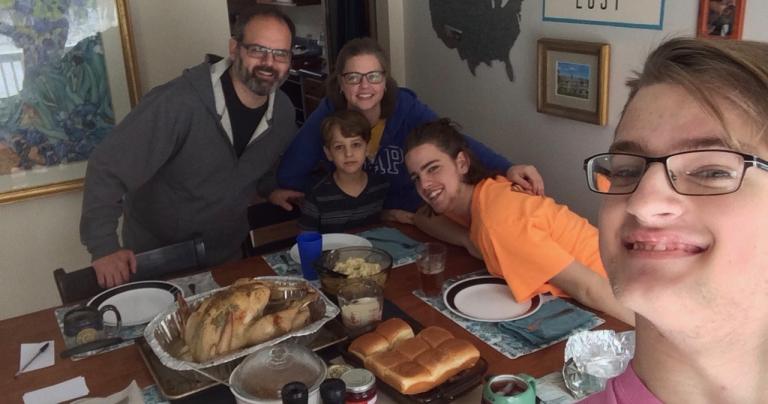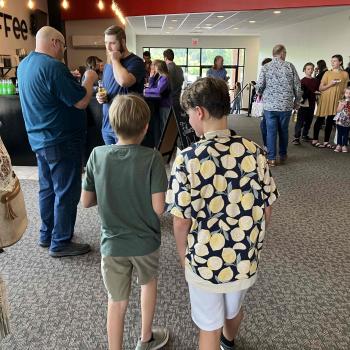Some people elevate the parental relationship so high that they seem to forget how to engage in the marital relationship. In a healthy family, the parents are a dyad, and the children are not on the same level. However, if the parents blur the boundaries with their children, an unhealthy triangulation occurs. Any time there is a triangulation that comes between the marital dyad, there is dysfunction.
Wherefore they are no more twain, but one flesh. What therefore God hath joined together, let not man put asunder. – Matthew 19.6, KJV
i. Guard the dyad
Someone else outside of the marriage is not always the one who comes in between the dyad. Many times, the parents blur the boundaries with their own children, and lose track of the marital bliss that makes them tick as a couple. One of the marks of a healthy family is that it guards the marital dyad.
Children & Parents
Do we want to be parents or buddies with our children? There is room for both, but the Scripture is clear that at the end of the day, we’re parents. Our key passage in Ephesians 6 is clearly divided between children (verses 1-3) and parents (verse 4).
Children, obey your parents in the Lord, for this is right. “Honor your father and mother”—this is the first commandment with a promise: “so that it may be well with you and you may live long on the earth.” – Ephesians 6.1-3, NRSV
And, fathers, do not provoke your children to anger, but bring them up in the discipline and instruction of the Lord. – verse 4
ii. Implications for the church
Sometimes we have to ask this type of question at work or in the congregation. Do we want to be buddies with everyone or are there specific roles and functions that are needed? I can speak for the congregation more than the marketplace. If we take a look at passages like Acts 6.1-6; Romans 12.4-8, 1 Corinthians 12.27-28; and Ephesians 4.11-12 we see that there are roles among the people of God.
As leadership, we want to empower people to share the Gifts that God has given them. These are endowments of virtue from the Holy Spirit. So our pneumatology may need to include a robust treatment of our participation in God’s good work.
On the other hand, we are not defined merely by our roles in the home or congregation. The relationships in the NT Church are probably a lot more organic than we can imagine today.
In the same way, the boundaries in the home empower the parents to be parents who empower their children to grow and mature into the people God has created them to be.
iii. Recognizing distinct roles in the home
In some ways, families in the ancient Near East (aNE) reflect the greater class or caste systems of their times. The Jewish philosopher Philo, who is a contemporary of our Lord and The Twelve, writes a Household Code based on the 10 Commandments (De Decalogo). He points out that there are class distinctions in the aNE home.
For parents belong to the superior class of the above-mentioned pairs, that which comprises senior, ruler, benefactors and masters, while children occupy the lower position with juniors, subjects, receivers of benefits, slaves.[1]
In some ways, Paul seems to agree with this distinction between parents and children. He clearly demonstrates that there is a chain of command, and a level of honor that must be maintained in the home. Paul and Philo are both basing this portion of their code off of the 10 Commandments.
The term “obedience” is made up of the preposition hupo in the Greek, which means “under” and the word akuo which means “to hear.” Thus the word means to listen with a submissive attitude.[2]
Couple the word obey with honor, which is a lifelong commitment to treat your parents with respect and reverence, and you have a very strong command for children. At the very least, we can teach children to obey while in the home, and to honor for a lifetime.
iv. Respect your elders?
We live in a culture that is largely driven by youth. For instance, how often do we see marketing that is directed at the elderly? How often are wise old sages the main characters in our movies? How many bands are there who have aged gracefully, while remaining a driving force in the music industry? Certainly we’re not living in an age when we can watch a young Frank Sinatra mature over time into an older Sinatra who is still packing out the largest venues.
Have our priorities changed? Do we still listen to the voice of the wise old sage? Is the old maxim respect your elders another saying that has faded with yesteryear? Or as a culture, have we left the elders at the gate of the city in our quest for the elusive fountain of youth?
v. Paul’s unique Household Code
There are instructions to children in the aNE Household Codes, but they are generally addressed to adult children who are caring for their aging parents. Although this may be partly implied from Paul’s writing, Paul is not addressing adult children (Ephesians 6.1-3). He is addressing children directly. This is a unique addition to Paul’s Household Code.
Paul’s message assumes that children are welcome in the reading community and that they are actually present in the congregation. This also assumes that they have the ability to become Christians as children. Paul is appealing to them not only as children, but also as children of God
Despite the prevailing culture that appeals primarily to the adults, it is unique that Paul begins this part of the Household Code by addressing children.
vi. All powerful fathers
Paul changes the role of the father in the Household Code, another unique addition that sets it apart from other aNE literature.
“The authority of the Roman father was legendary in the Greco-Roman world.”[3] The father has ability to choose to keep children, sell them, or put them up for adoption. He has the ability to approve or disapprove of the marriages of his children. He is in charge of all of his children’s educational pursuits and everything that crafts them into full-fledged citizens.
The father is all-powerful in the aNE Household Code, but Paul’s Household Code says do not exasperate your children . . . “fathers, do not provoke your children to anger” (Ephesians 6.4). Today we could say, do not neglect, do not micromanage their development, do not set the bar too high, do not fail to offer support, do not show favoritism, etc.[4] In all of these ways and more, we are capable of making life difficult for our children.
Apply the verse however you want, because that is exactly what Paul is commanding the fathers in the Primitive Church to do. This is a revolutionary statement that elevates the status of children, as a primary consideration for the all-powerful fathers of that age.
vii. Paideia
Although the all-powerful role of the father is weighed in the balance, the power of the father finds new ground in the church. In the aNE Household Codes, one of the roles of the fathers is to oversee the educational pursuits of their children. In ancient Greco-Roman society the education is of utmost importance. Education is a communal effort, usually overseen by the men of the local society. It’s called the paideia.
The paideia is more than just instruction in classroom settings, reading, writing, and arithmetic. It is the way that youth are molded into adults and responsible citizens. The paideia includes work outside of the classroom in apprenticeships. It includes athletics. In Greece it also includes a tour in the military. It includes training in philosophy, morality, ethics, and the classical Greek virtues.
Youth are crafted into thinkers, workers, warriors, and citizens who contribute to society. Society looks to the fathers, the heads of households, the businessmen, the warriors, to train the youth within the greater scope of the paideia.
viii. Why is this important?
Because this is exactly the term Paul uses. He not only uses the term “instruction” (Ephesians 6.4). He also uses the term “discipline,” or paideia in the Greek. Now we can define paideia however we like, looking back at the language. But how does the Primitive Church that speaks Koine Greek define paideia? They see it as it is being used by the Greco-Roman world. It is the commonweal for the education of the whole person.
Greek society looks to the fathers of their cities to oversee the paideia. Paul calls on the fathers of the Primitive Church to oversee a new paideia, one that raises up spiritual children to be responsible citizens of a new Kingdom.
This is not only about the home. This is not just about 1 father in 1 home. Paul is seldom uses the term father in that way. First and foremost, he uses the term father in relation to our Heavenly Father. Secondly, he uses the term father or fathers in the same way we would use our term founding fathers. He often uses father to refer to the role of an elder, or a great father of the faith like Abraham. Therefore, it is likely that Paul is calling on the fathers to rise up and pour a foundation for a new paideia, one that will raise up children and disciples for our Lord.
Are the lines blurred in the home or is the parental dyad protected?
Are children welcome, not only as family, but in the congregation as fellow believers?
Paul makes children welcome among the people of God, do we?
Is Paul also calling for education in the home and church through mentoring relationships?
Rev. Jared Ingle
Pastor: Long Lake Friends Church
Supervised Therapist: personal, couples, families
Traverse City, MI

series articles:
Submission CLICK HERE
Submission in the House of God CLICK HERE
The Sanctity of Water & the Word CLICK HERE
The Husband as Kephale CLICK HERE
Paul on the Role of Husband & Savior CLICK HERE
Revisiting the Wife’s Role as Help Meet CLICK HERE
Love CLICK HERE
Respect CLICK HERE
series sermons:
Submission CLICK HERE
Sanctification CLICK HERE
Sexuality CLICK HERE
Husband, Head & Savior CLICK HERE
Revisiting the Wife’s Role as Help Meet CLICK HERE
Love CLICK HERE
Respect CLICK HERE
notes:
[1] Philo quoted in Paul J. Achtemeier, Joel B. Green, and Marianne Meye Thompson, Introducing the New Testament: It’s Literature and Theology (Grand Rapids, MI: Wm. B. Eerdmans, 2001), 525. [2] Vernell Ingle, The Truth About The Family: Biblical Patterns And Principles (Joplin, MO: Messenger Publishing House, 2005), 104. [3] Achtemeier, Green, and Thompson, 47. [4] Frederick J. Long, OneBook Daily-Weekly: The Letter to the Ephesians (Franklin, TN: Seedbed Publishing, 2017), 125.JC Ingle, Inc.











